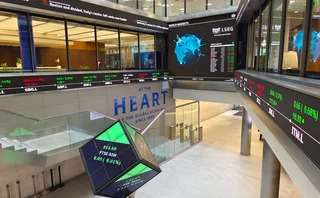
Fintech start-up of the year: Beacon
Risk Awards 2017: Ex-bankers bring top dealer risk tech to the masses

First came SecDB at Goldman Sachs, then Athena at JP Morgan, then Quartz at Bank of America Merrill Lynch (BAML). Looking for an edge on the competition, each bank in turn built a pricing and risk system that was more complete and more flexible than anything the industry had seen before.
SecDB came to be known as Goldman's ‘secret sauce' – a platform credited with making the bank's army of quants and developers more productive than those of its rivals, and helping the bank avoid losses during the financial crisis.
Now, a group of technologists who worked on or launched those systems is giving similar capabilities to small hedge funds, regional banks, commodity trading firms, insurers and even to big dealers that want to update their own ageing risk frameworks. Known as Beacon, their product is a cloud-hosted service that offers a package of off-the-shelf trading and pricing tools, but the more innovative foundation for this is a development platform that allows users to quickly develop, roll out – and control – analytical apps. That makes it unique, clients say.
"They are helping us build SecDB for an insurance company," says Peter Cai, chief risk officer at Global Atlantic Financial Group (GAFG), an insurer spun out of Goldman Sachs.
GAFG needed to aggregate data across multiple trading systems and run a complete portfolio of assets, liabilities and hedges through complex scenarios. The upfront capital and operational expenditure associated with home-growing Beacon infrastructure, including consultancy fees, would easily extend into seven figures, Cai estimates. Instead, GAFG is paying by the hour to run Beacon from the cloud, making it easier and more cost effective to research new business models.
"It takes a larger insurance company months to put together a scenario that stresses the entire company across assets and liabilities. With the enterprise risk infrastructure being built with Beacon, we will be able to do it in days," Cai says.

Beacon makes it easy for software or data vendors to create and offer third-party packages in the Beacon app store
Kirat Singh, Beacon
Trading risk management provider Simplex, meanwhile, is partnering with Beacon in building a credit valuation adjustment (CVA) system for use by Japanese banks, and the next generation of Simplex's trading risk system will also be built on top of the Beacon platform. Ryunosuke Matsutake, Simplex's head of quantitative analytics and financial engineering, says the software firm chose an alliance with Beacon because it is a "unique platform with no direct competitor".
The background of Beacon's architects is also unique. Kirat Singh and Mark Higgins co-founded the firm in 2014. Singh, the firm's chief executive, had previously spent eight years building SecDB, before launching and delivering both Athena and Quartz; Higgins, the chief operating officer, worked alongside Singh at JP Morgan on the Athena project before which he developed pricing and risk solutions in SecDB.
The firm's chief commercial officer, Michael Kirch, spent 12 years with Goldman's commodities business.
Singh says Beacon is an attempt to take all of this accumulated wisdom and do something new with it: "We founded Beacon to create a modern collaborative technology environment in the world of institutional finance. Financial institutions and vendors have historically built closed proprietary technology to solve specific business problems. At Goldman, JP Morgan and BAML, we were very successful in building cutting edge trading systems based upon open transparent platforms. Beacon enables the same level of innovation and business agility for our clients and makes it easy for software or data vendors to create and offer third-party packages in the Beacon app store."
Complementary offering
With both Goldman and JP Morgan giving clients access to a portion of their systems, Beacon feels it is a complementary offering to the externalised front-office pricing and risk analytics technology being rolled out by the firm's former employers. Singh casts this as an opportunity for Beacon, and he welcomes a trend towards creating a more open and collaborative fintech ecosystem.
His hope is that Beacon could act as a "bridge" between a bank's proprietary analytics and data and its external end-users - potentially solving some of the technology challenges involved in creating access, as well as the practical challenge of ensuring client data confidentiality.
Beacon has been designed with maximum flexibility in mind. The source code and client data are securely segregated and permissioned. Different micro-services can be used independently of each other, such as a data warehouse that comes with a large set of market data and suite of financial analytics, job schedulers, a dependency graph and enterprise controls that keep tight reins on business-critical applications while still allowing a firm's developers to be nimble and experimental.
It has already won a host of converts, who are using the platform in a variety of ways. Flexibility is a commonly cited draw. For example, tail risk hedge fund Asymmetric Return Capital uses the platform to deal with highly complex derivatives analytics. The fund's chief investment officer, Bryan Wisk, says he could not find another vendor platform that met its needs.
Axpo US, a subsidiary of Switzerland-based energy trader Axpo Group is utilising Beacon as a risk management system because it has the ability to integrate structured transactions into a real-time risk and pricing engine.
Jeremy Wodakow, head of Axpo US, says: "Other than in-house systems built by large banks, existing commodity enterprise TRM products often require plugins - C#, Excel, etc - to manage and value complex deals. Beacon programmers maintain the core infrastructure, but the transparent source code allows us to customize the platform and develop proprietary pricing models directly in the system. Axpo US is leveraging Beacon to drive our customer business forward by providing a cost-effective solution to price both simple and highly complex deals and manage our risk in an efficient, sustainable manner."
By all accounts, the sauce – though less secret these days – is just as tasty as ever.
Only users who have a paid subscription or are part of a corporate subscription are able to print or copy content.
To access these options, along with all other subscription benefits, please contact info@risk.net or view our subscription options here: http://subscriptions.risk.net/subscribe
You are currently unable to print this content. Please contact info@risk.net to find out more.
You are currently unable to copy this content. Please contact info@risk.net to find out more.
Copyright Infopro Digital Limited. All rights reserved.
As outlined in our terms and conditions, https://www.infopro-digital.com/terms-and-conditions/subscriptions/ (point 2.4), printing is limited to a single copy.
If you would like to purchase additional rights please email info@risk.net
Copyright Infopro Digital Limited. All rights reserved.
You may share this content using our article tools. As outlined in our terms and conditions, https://www.infopro-digital.com/terms-and-conditions/subscriptions/ (clause 2.4), an Authorised User may only make one copy of the materials for their own personal use. You must also comply with the restrictions in clause 2.5.
If you would like to purchase additional rights please email info@risk.net
More on Awards
Best vendor for system support and implementation: Murex
Murex has won the Best vendor for system support and implementation at the Risk Markets Technology Awards, recognised for its innovative MX.3 platform, exceptional client support and seamless implementation services
FRTB-IMA product of the year: Murex
Murex wins FRTB-IMA product of the year for its advanced, scalable MX.3 platform enabling seamless regulatory compliance
Pricing and analytics: equities – Finastra
Finastra’s Sophis platform wins the Risk Markets Technology Award for Pricing and analytics in equities, recognised for its robust capabilities in equities and derivatives trading
Best execution product of the year: Tradefeedr
Tradefeedr won Best execution product of the year for its API platform, which standardises and streamlines FX trading data, enabling better performance analysis and collaboration across financial institutions
Collateral management and optimisation product of the year: LSEG Post Trade
LSEG Post Trade wins Collateral management and optimisation product of the year for interconnected services that help mitigate counterparty risk and optimise capital usage
Clearing house of the year: LCH
Risk Awards 2025: LCH outshines rivals in its commitment to innovation and co-operation with clearing members
Driving innovation in risk management and technology
ActiveViam secured three major wins at the Risk Markets Technology Awards 2025 through its commitment to innovation in risk management and technology
Regulatory reporting product of the year: Regnology
Regnology retains its award for Regulatory reporting product of the year at this year’s Risk Markets Technology Awards







